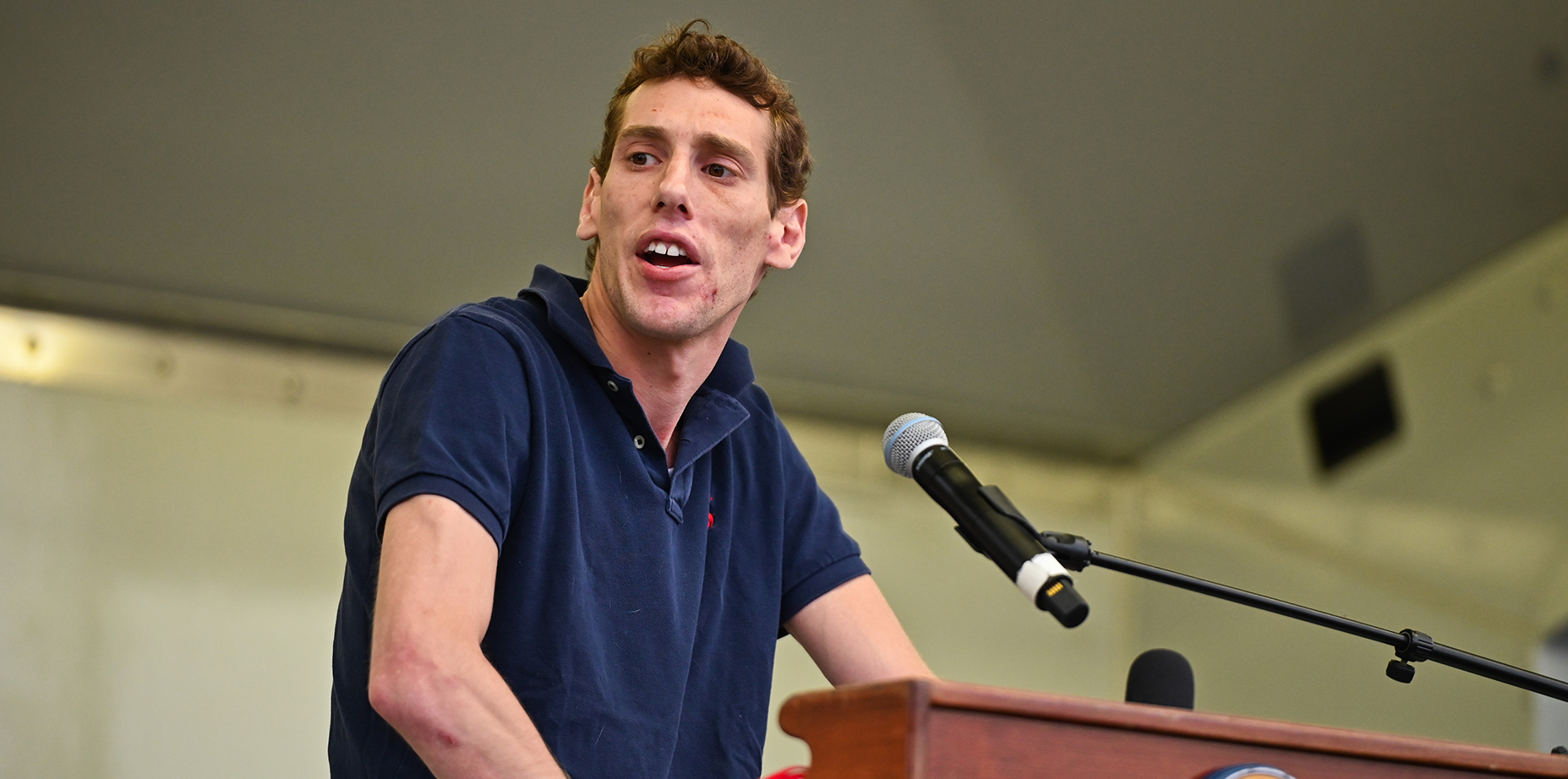(New York Jewish Week) — Before Joseph Borgen was beaten in the street nearly two years ago, on the way to a pro-Israel rally, he enjoyed playing basketball after returning home to the Upper East Side from his day job as an accountant.
In the time since Borgen, now 30, was attacked, that hasn’t been possible. The incident — in which five men shouting antisemitic slurs punched, kicked, pepper-sprayed and beat Borgen with crutches — left him needing surgery on his wrist. Only recently has he started going back to the gym.
“It’s something that is still lingering and I’d love to put it in my rearview,” Borgen, who is the eldest of five siblings, told the New York Jewish Week. “It doesn’t just only affect me. My little brother was seeing me on the news. He’s still a kid. We’re very close.”
The attack on Borgen drew national attention, and came amid a string of antisemitic assaults in the United States surrounding the May 2021 conflict between Israel and Hamas in Gaza. Now, Borgen is caught in a conflict of a different kind, one that illustrates the long tail of hate crimes that have faded from public consciousness. He doesn’t want the beating to define him, but finds that its after-effects have festered — and that a controversy over the ensuing trial of his alleged attackers has spurred him to become a passionate, if ambivalent, advocate against antisemitism.
“There is some value and good in speaking about what happened and just getting the message out there,” Borgen said. “But it’s not something I want to harp on.”
Borgen was walking to a pro-Israel rally when he was attacked in the street in midtown Manhattan on May 20, 2021 — the same day Hamas and Israel announced a ceasefire after 11 days of conflict. A blurry video of the attack that circulated on social media showed a small crowd of men surrounding Borgen, kicking him and beating him with sticks. A photo of Borgen from later that night shows Borgen with a puffy red face, and wearing a neck brace.
“I was just wearing a kippah, listening to music, just minding my own business — and it all just erupted,” Borgen said, recalling the incident. “Before I can even really react or do anything, there’s a group of individuals surrounding me. I didn’t have the time to process what was going on.”
Borgen is still facing those who have been accused of attacking him — but that confrontation has moved to the courts. The lead defendant, Waseem Awawdeh, was charged with hate crime assault, along with a list of other charges. The case is still in process, and the next hearing is on April 20.
“I can’t even tell you how hard personally I’ve been fighting for this,” Borgen told the New York Jewish Week. “If there’s no accountability or consequences of what took place, what happened to me is going to happen to someone else.”
Borgen is currently worried that Awawdeh will go to prison for a small fraction of the maximum sentence he faces, which, according to Borgen’s attorney, is 15 years. That concern stems from reports in the New York Post and New York Sun that Manhattan D.A. Alvin Bragg offered Awawdeh a six-month plea deal.
Those reports have sparked a chorus of criticism, as well as a letter to Bragg by nearly two dozen groups lobbying against the deal. The signatories were a mix of right-wing, pro-Israel and Orthodox groups, including the Rabbinical Council of America, an association for Orthodox rabbis; the Zionist Organization of America, a right-wing organization; and Americans Against Antisemitism, a group founded by former New York State Assemblymember Dov Hikind, who represented a Brooklyn district.
“Failing to impose severe consequences here would send the dangerous and unacceptable message that Jews can be brutally attacked with impunity,” said the letter, which was sent earlier this month.
Hikind told the New York Jewish Week that he wants more Jews to vocally support Borgen. “We need to fill the courtroom,” Hikind said. “Unfortunately, we’re just not there. The community needs to come out.”
The six-month deal, however, seems like far from a sure thing. Awawdeh’s lawyer, Peter Marc Frankel, confirmed the deal to the Post in January, as did prosecutors on the case. But speaking to the New York Jewish Week on Monday, Frankel said he was unsure if the deal would come to fruition.
“I don’t know if it’s going to happen, frankly,” Frankel said. “It’s unclear at this point. I don’t know if it’s going to be a six-month deal, but I would not expect a shorter deal, certainly.”
The deal has not yet been openly discussed in court, and Borgen’s lawyer, Ross Pearlson, who is representing his client pro-bono on behalf of the Anti-Defamation League, told the New York Jewish Week that “it’s not clear” if the six-month deal will hold.
“I’m unaware of any offers being made,” Pearlson said. “I believe that a year would be more appropriate. Six months to me still seems a little light considering the mob violence and the damage that was done to [Borgen].”
Bragg’s office declined to comment on the deal. The ADL likewise did not respond to requests for comment on the case.
Shortly after the attack, in 2021, a prosecutor on the case said that Awawdeh had told one of his jailers, “If I could do it again, I would do it again,” according to the Post. But Frankel told the New York Jewish Week that “that quote was taken completely out of context” and that Awawdeh has offered to meet and apologize to Borgen. He also met with the prosecutors to explain how remorseful he felt.
“[Awawdeh’s] behavior was the result of bad impulse control and a bad reaction to a bad situation, rather than an effort to try to seek someone out who is Jewish to commit a hate crime,” Frankel said.
Pearlson added that Borgen “has been traumatized by this event.”
“He’s very emotional when I speak to him about it,” Pearlson said. “He gets agitated for each one of these court appearances. When we talk about the case, he’s passionate about it.”
There are now five defendants in the case, including Awawdeh, and the D.A.’s office is treating them differently based on their alleged respective roles in the beating.
“Justice is not one size fits all,” Pearlson said. “It doesn’t move quickly, but in this case, it’s not the D.A.’s office delaying things or dragging its heels. There’s going to be some element of justice done.”
The fact that Borgen’s case is being prosecuted at all puts it in the minority of hate crimes complaints in Manhattan. According to NYPD statistics, police precincts in the borough received 241 hate crime complaints in 2022, and made 118 arrests based on those complaints.
Bragg’s office told the New York Jewish Week that 92 hate crimes were prosecuted in Manhattan last year. His office currently has 20 open hate crime cases related to antisemitism for this year. A report last year in The City, a local publication, found that most hate crimes charges are dropped before any convictions take place.
Although Borgen remains involved in the case, and has spoken about his experience publicly, he suggested that it was still hard to think about.
“Some people have said, ‘God only put you through this because you can handle it,’” said Borgen, who is modern Orthodox and puts on tefillin daily. “But if I start to think about it in those terms, I don’t want to go there. I don’t want to let it factor into my views on God and spirituality because if I did, it might make me start to question and wonder about things. I don’t want to go down that road.”
On March 9, Borgen appeared in court, sitting in the same room as his alleged attackers. While he could not comment on the specifics of the hearing, not wanting to impact court proceedings, he said that “it sucks to be in the same room as individuals who could have killed me.”
“I don’t like going to court,” Borgen said. “I do it because when I’m there with other people, a large group of Jewish individuals, it sends a message that we’re not lying down and taking this.”
The New York Jewish Week brings you the stories behind the headlines, keeping you connected to Jewish life in New York. Help sustain the reporting you trust by donating today.





